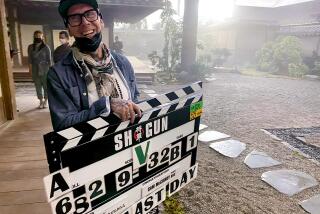Review: Restrained ‘Hara-Kiri’ opts for character over craziness
- Share via
The prolific Japanese director Takashi Miike is arguably one of the world’s most deeply eccentric and unpredictable filmmakers — titles such as “Audition” and “Ichi the Killer” are now classics of international genre for their gleeful disregard of convention and expectations.
With his latest, “Hara-Kiri: Death of a Samurai,” a remake of a 1962 film, Miike brings a formal, elegant restraint to his usual flair for wild theatrics.
Told in layered flashbacks, the film examines the ancient feudal system via a practice where a down-on-his-luck warrior may ask to perform ritual sacrifice in the home of a lord. The better the house, the greater the honor of the death.
A man, Hanshiro (Ebizo Ichikawa), making such a request is regaled with the story of another man (Eita) who made such a claim as a ruse for begging money and was forced to a cruel and humiliating death. Then Hanshiro tells a story of his own.
The slow-burn of Miike’s previous film “13 Assassins,” also a remake, built to an extended battle that may be one of the great sustained action sequences of recent years. “Hara-Kiri” builds and builds as well, but its revelations are more character-derived that action-oriented, so the film never reaches the cattle-on-fire craziness of its predecessor.
Shooting in 3-D, Miike uses the technique to create deep spatial relations, frames within frames or a delicate lacework of falling snow, rather than the spurting blood and thrusting blades one might expect.
----------
“Hara-Kiri: Death of a Samurai.” No MPAA rating; in Japanese with English subtitles. Running time: 2 hours, 8 minutes. At the Downtown Independent, Los Angeles.
More to Read
The biggest entertainment stories
Get our big stories about Hollywood, film, television, music, arts, culture and more right in your inbox as soon as they publish.
You may occasionally receive promotional content from the Los Angeles Times.











